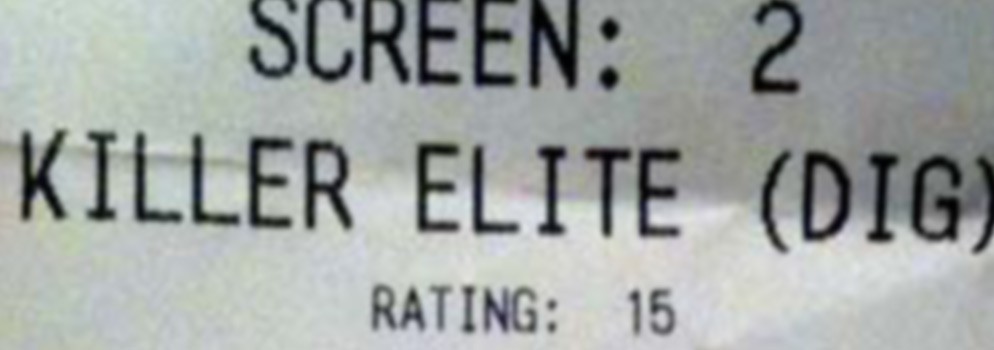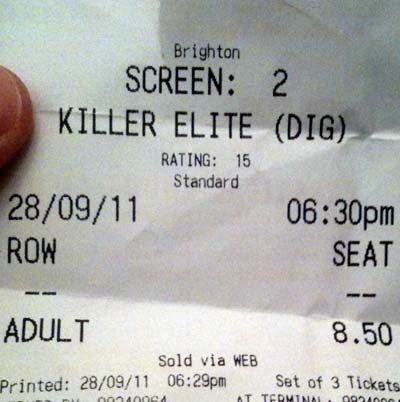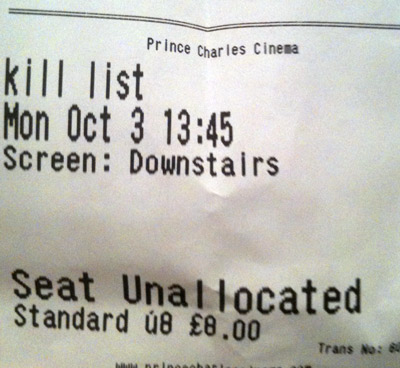Kill List & Killer Elite

Close your aperture and think of England
In 1946, some idiot named Mr. Roberto Rossellini made a film called Rome, Open City, thinking that showing real life was a great way to save money. The critics, unsurprisingly, agreed. Two years later, another idiot called Mr. Hans Morganthau wrote a book about how it was basically okay for states to do whatever they wanted, since this behavior would somehow balance itself out. States, unsurprisingly, agreed. In an inspired rhetorical coup, both movements took the title of ‘Realism’, thinking, very correctly, that no matter how dull the subject matter or inane the explanation, the name itself was a really good way to win arguments. You’re a Marxist? That’s nice, but I’m a realist. You make films with well constructed characters, dialog and theme? Well, I’m a realist. You’re a member of the The Official Monster Raving Loony Party? Well, that’s actually pretty great. You win. But realism is totally second place.
I mean, at the very least they'd talk about what happened on the last episode of Law & Order: SVU. They have a life outside of crime. Watching crime on television.
I hate realism, of both types, and for many reasons, but I’m here to talk about the irksome Kill List, so the kind that annihilates everyone on earth with a nuclear war and then tells us it was rational, we’ll just leave that to the side for now. Actually, that’s not fair. We’d all be dead, so they couldn’t tell us anything. They’d say it was rational before we were disintegrated into our component elements. I wouldn’t want to make it sound like they were idiots.
Realists in film, likewise, want to escape the responsibility of creating tension, and measure their success in terms of how much they captured real life. Well, how much they fooled you into thinking they captured real life. Well, how much they fooled themselves into thinking they fooled you into thinking they captured real life. Whenever something is undramatic, insightless, or utterly lacking in tension, the realist genre gives the filmmaker the ultimate cop-out: but that’s the way it would happen, man. The two-fold problem being that A) No, it wouldn’t, and B) You know, with all the limitations of the fact that it was totally staged, of course.


British film, due to budget, or simply thinking that the working class was cool enough to steal its credibility by depicting it onscreen, but not so cool that you would actually want to hang out with them, has a long tradition of such nonsense with the intolerable Mr. Ken Loach, the occasionally tolerable Mr. Mike Leigh, and the death by disintegration into component elements by the recent spate of ‘urban films’ like This Is England, London to Brighton, Kidulthood, and even Attack the Block. In a way, this culminated with the kid in front of me in line at the pet food store saying, and I quote, ‘Whatever, innit?’, and my having no idea if it was real. Sorry, ‘real’.
Did I just reduce the complex history of British filmmaking to a few wildly inaccurate sentences? I may have mentioned: I hate realism.
And so this is what I thought I was getting in the agonizing first 26 minutes of Kill List, the film, or so I thought at first, which belongs to this genre. Note to future filmmakers, if I’m writing down how many minutes in I am when things are happening in your film, this is not a good sign. What if, Mr. Ben Wheatley seems to ask, hit men were like, blokes arguing about finances with their wives and so on. It would be boring, sure, really boring. But so real. ‘Additional dialog by the cast’ real.
(shudder)
But there is a problem when you go with realism. You must, technically speaking, be realistic. With cast supplied dialog, the argument can be made that we have a semi-believable portrait of arguing spouses, and totally believable portrait of arguing actors.
What we do not have is an accurate, or even interesting, portrait of the acts or psychology of violence. This is, not incidentally, what I’m writing my PhD in. When Mr. Woody Allen was standing in line during Annie Hall, he had the opportunity to pull out Marshall McLuhan to shut the blowhard up. In this case the film is the blowhard, and I am Marshall McLuhan.
You know nothing of my work.
I won’t go into the whole understanding that hitmen work alone, that they use the mental map of planning to overcome natural, or at least human, aversion to violence, or Athens’ concept of the process of violentization in which those that experience violence as a effective solution naturally means that it would bleed into all aspects of their everyday behavior. Even though I just did go into it, I won’t go into it.
Instead, I’ll just make the everyday observation that if your major plot point revolves around a hitman getting a conscience when he encounters (offscreen, and thus ‘mysterious’) sexual violence, you’re saying that you’ve got a someone that has lived a life among criminals where this, you know, just never came up. I mean, at the very least they’d talk about what happened on the last episode of Law & Order: SVU. They have a life outside of crime. Watching crime on television.


And so suddenly the film shifts entirely and becomes a strange remake of The Killer Elite, strange since they were made at the same time; they’re really getting impatient with the whole remake thing. The Killer Elite is itself is a kind of object lesson in everything not to do when making a movie, and both films share a kind of check box narrative style.

Based on true story, probably would have been better if it was more real. I know: I’m a study in contradictions. Well, a lounge at the very least.
The killers must kill three people. Then they do. This is technically a story, in that it occurs, but it fails to register the importance of the setback in storytelling. The final season of 24 was ridiculous and even occasionally boring, but those guys understand structure, and they follow the basic principle: make it worse. When things are going bad for Mr. Jack Bauer, then you take something else away from him, then something else, then maybe throw him a bone, and then really drop the hammer. When your kids tell you: ‘Mommy, look, I wanted to do X, and then I did it!’, I might begrudgingly accept that’s something to be proud of. But your kid didn’t charge me £8.50 and make me sit through 22 minutes of commercials. Well, not yet, he didn’t. The century is still young.
The Take – Killer Elite

$1.00
Then Kill List makes another radical shift and abandons realism in the most marked way possibly, with cackling villains who are behind it all. What is the ‘it’? Well, a mysterious sex and death cult, of course, whose purpose is seemingly only to shock the audience. Sorry, shock the audience from 1968. Sorry again, half the audience from 1968. After all, in 1968, no one had seen The Wild Bunch, Don’t Look Now, or The Wicker Man. Or, Law & Order: SVU for that matter.
Strange that all these (not SVU, sorry Ice-T) still work, largely because they are not about the shock itself; a story with a sense of humor, or purpose, likewise characters with same. Like Killer Elite, Kill List presents a world that’s in love with sociopaths, that seems to say without any irony or awareness ‘Bullies! They’re fun!’ The killer with a heart of gold at least has a heart of gold that we can melt down to make other killers. These guys are just dicks.
As far as I could tell, I was supposed to sympathize with them because their hot tub wasn’t working, and they needed the money to fix it. I did feel bad for the hot tub, but fortunately the dad hitman is tricked into killing his own family in the final moments, in a scene that is cannot be surprising for the very reason that we know that the film is so desperate to be shocking.
You may thank/hate me for giving away the ending, but there’s no way you wouldn’t have guessed it; the film, violating the Egregious Use Of Title Cards rule (sorry, I should explain that. Never. Put. Title Cards. In Your Film. For Any Reason. If I Don’t Care That You’re Woody Allen, I Really Won’t Care If You’re Trying To Rip Off Woody Allen), announces each victim in big white letters: THE PREIST, THE ACCOUNTANT, ANY SENSE OF TENSION OR SYMPATHY and so on. When it says THE HUNCHBACK, its ‘let’s fix it in post’ attempt to surprise us succeeds at the exact opposite. Good news for the hot tub, though: you’re getting a new family!
It would easy to say (as my friend Richard did) that this is the direction British cinema is going (remember, it’s okay that he said because 1) he’s British and 2) he hasn’t actually seem any of the films). But last years’ Skeletons and The Disappearance of Alice Creed were actually quite well done, the former an effective example of the comedy of believing in your own surrealist universe, and the latter a movie whose twists derive from the characters and not from the need to have twists.
It’s understandable that we want a rationalization; we’re pissed because these movies suck, and, I can tell you from the experience of the last 1,600 words, even tearing them a new one on the internet isn’t going to be enough to satisfy our sense of justice. But British film is like every other kind of film: most of them are terrible, and some are occasionally good. You just can’t make generalizations like that. No, the only explanation is that 2011 is the worst year in cinema history. You can, as it turns out, make generalizations like that.
The Take – Kill List

$-7.00
The Lonely Comments Section

 [logo]
[logo]
